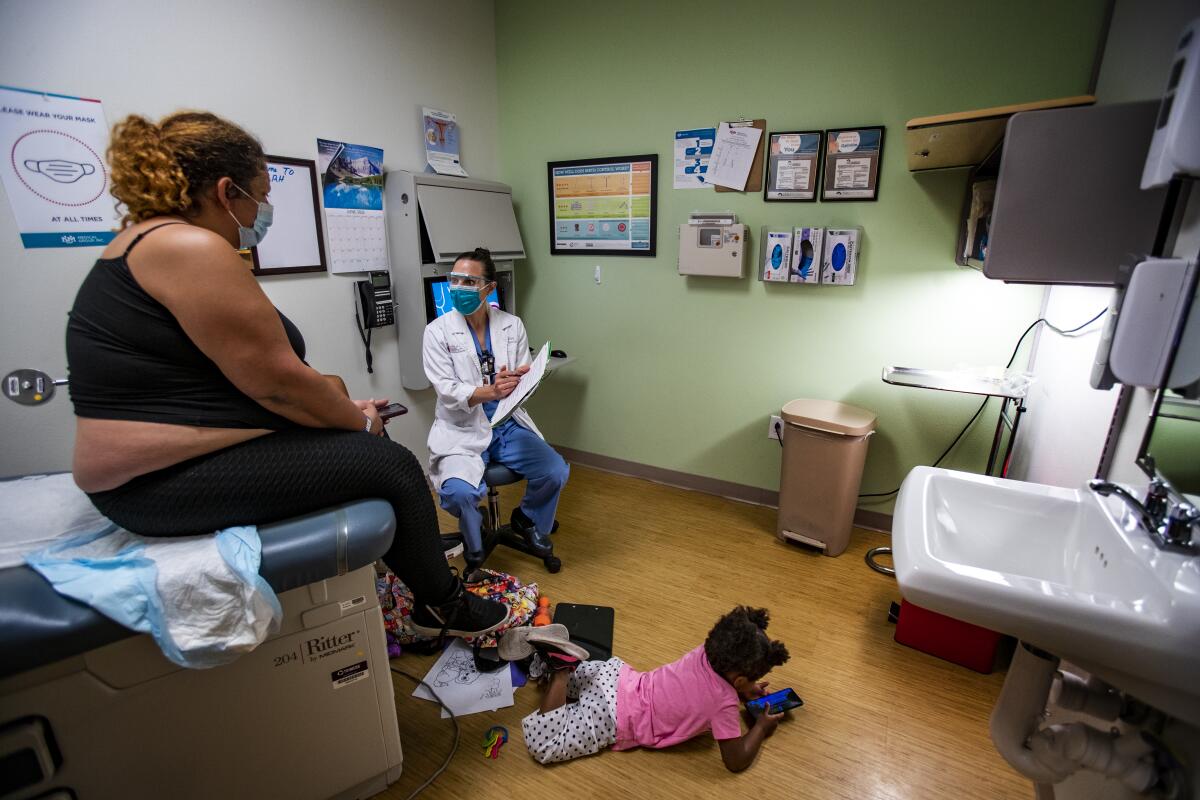Supreme Court to pregnant women: Good luck with that

- Share via
Happy Thursday. There are 193 days left until the election and we are back in the Supreme Court — last time for a while, I swear.
But I can’t come up with anything funny to say about it, because my heart is heavy. It looks like the United States is quickly reverting to a place where pregnancy is a dangerous condition, no exceptions.
The justices heard another abortion access case on Wednesday. This one was a last-ditch hope by the U.S. government to protect women having medical crises that may require an abortion in an emergency room.
You’ve likely read headlines about how the court seemed uncertain or divided on this case. It was, as UC Davis law professor Mary Ziegler told me after the oral arguments, ‘“more of a jump ball” than she expected.
But not by much.
Here’s the cut-to-the-chase: The hearts of the conservative majority, like the Grinch’s, remain two sizes too small. They are unlikely to come sledding down Mount Misogyny anytime soon.
“I don’t mean it to be dramatic here, but it means women will die,” said Azaleea Carlea, legal director of Legal Momentum, the nation’s oldest legal advocacy organization for women’s rights.
Let’s take this depressing walk together.
You're reading the L.A. Times Politics newsletter
Anita Chabria and David Lauter bring insights into legislation, politics and policy from California and beyond. In your inbox three times per week.
You may occasionally receive promotional content from the Los Angeles Times.

Ronald Reagan knew it was wrong
The law we are talking about is the Emergency Medical Treatment and Labor Act, or EMTALA.
In the 1980s, when Ronald Reagan was president, for-profit healthcare was just taking off. But many Americans lacked insurance, and these cash-for-service health entrepreneurs had little interest in helping any old straggler who wandered through the emergency room doors.
So they were turning away very sick, very injured people (and even pregnant women in labor) because they were too poor to pay.
Guess who was usually too poor? If you answered Black and brown people, you are correct! In Chicago, where a lot of this was documented, nearly 90% of those booted from private hospitals were minorities.
Thus was invented the wonderful practice that would come to be known as “patient dumping.”
That was obviously a terrible thing to do, but within the rights of the private company. So legislators came up with a way to fix it.
They told private hospitals that if they wanted public funding through Medicare and Medicaid (which they do, because that is beaucoup bucks, like seven-zeroes money) they had to provide at least “stabilizing care” to people in an emergency.
Including pregnant women.
Flash forward: Idaho 1864
Did I say 1864? Sorry, I meant 2024, but really, same difference.
Like Arizona, Idaho has essentially gone back to the 19th century — creating a near-total abortion ban except to save the life of the woman or if you have an actual police report documenting rape or incest. Because pregnant children love to talk to police, but I digress.
So Idaho says no abortions unless death is hovering.
EMTALA says the standard can’t be if a woman is going to die — but whether her health may be permanently and seriously harmed.
As the U.S. Solicitor Gen. Elizabeth Prelogar put it Wednesday: “In Idaho, doctors have to shut their eyes to everything except death, whereas, under EMTALA, you’re supposed to be thinking about things like, is she about to lose her fertility? Is her uterus going to become incredibly scarred because of the bleeding? Is she about to undergo the possibility of kidney failure?”
One of the big issues before the Supreme Court was whether the federal “health” standard should trump the state “dying” standard.
Which is an argument that has nothing to do with abortion — that’s a states’ rights debate, going back to the “supremacy clause” in the U.S. Constitution, which says the federal government gets to make laws that states must follow.
Like EMTALA.
Idaho argued that its law wasn’t going against federal law because “nothing in EMTALA forces doctors to provide illegal treatments.”
It’s not that Idaho is refusing to stabilize pregnant women in distress, it’s just that abortion is simply not an available way to do that, its lawyer, Josh Turner, claimed.
“Idaho has set its own standard of care,” he told the court. So, the issue isn’t if Idaho needs to comply with EMTALA, but how it is doing so — through lame substandard care that is totally fine with the (non-doctor) men who passed the law and which should also be cool with the Supreme Court.
That includes forcing some women to take expensive emergency medical helicopters to other states for care. That has happened six times so far this year at the state’s major emergency hospital. Last year, it happened once.
Most of the court acted like this was indeed totally fine with them, even if it sounds a lot like patient dumping.
A Hail Mary from the Biden administration
Not so fast, argued the U.S. solicitor general. Because the Constitution.
She argued that the supremacy clause makes it so that the state can’t just set its own standard of care to circumvent federal law. There are national standards of care to consider. We have medical norms.
Because what would it mean it any state could just outlaw any care it didn’t want to provide? After abortion, what would be the next target?
“The ramifications here have to be driven home,” said Carlea, the civil rights lawyer. “This is not just about women or women’s rights, it is really about any patient that could present at an emergency department.”
Justice Sonia Sotomayor ran through a bunch of examples (some of them drawn from real-world stories) of when a woman might need an abortion but not be dying. For example, what if her water breaks before the fetus is viable? That can lead to sepsis, which is serious, though not immediately fatal.
At which point Idaho’s lawyer tried this: There is “no daylight” between EMTALA and the state ban because a woman doesn’t have to be dying then and there. As long as she is likely to die at some point, she can have an abortion, sort of. Not always.
Wut?
Then, “Why are you here?”
That was conservative Justice Amy Coney Barrett, who seemed taken aback when Idaho’s attorney made this claim. What came next was a master class on how not to talk to a smart woman. Dude, let her finish.
They hashed it out to this unsatisfying conclusion: If an Idaho doctor in good faith decides an abortion is necessary to save the woman’s life — even if death is not imminent but likely at some point — they can do it.
But, asked Coney Barrett, “What if the prosecutor thought differently? What if the prosecutor thought, well, I don’t think any good-faith doctor could draw that conclusion?”
Turns out, if the local prosecutor disagrees with the doctor, it’s on that doctor to personally defend the decision — facing up to five years in prison and the loss of their medical license.
Guess how many Idaho doctors are willing to take that “good faith” risk?
I tell you this exchange for a reason. Coney Barrett was annoyed that the Idaho lawyer was “hedging.” Enough to side with the U.S. government?
Let’s call her a slight wobbler.
Enough. What does it all mean?
One wobbler in a six-person conservative bloc isn’t going to save emergency abortion care.
It’s “more likely than not that Idaho is going to win,” said Ziegler, the UC Davis law professor.
A best-case scenario might be that the court rules more narrowly than simply striking down the EMTALA provisions or saying they have no application here.
But that’s not much of a win.
This is the last abortion case the court will hear this year, and it now becomes solely a legislative and ballot-box issue.
We are left with an America that is more dangerous for pregnant women — because their care is restricted, beyond reproductive rights.
It isn’t just Idaho. Fourteen states have near-total abortion bans and 41 states have bans at some point that include only limited exceptions.
After the Supreme Court announces its decision in this case in June or July, pregnancy will become a riskier proposition. An expectant woman walking into an emergency room will likely have no way of knowing if she will receive care in many states. A doctor in that emergency room may face the choice of prison or leaving that woman in pain, fear and distress.
It is, said Carlea, “a really sad point in the history of our country.”
What else you should be reading
The Must-Read: Arizona House votes to repeal Civil War-era abortion ban
The Don’t Tell the Kids: ‘Thunder Run’: Behind Lawmakers’ Secretive Push to Pass the TikTok Bill
The L.A. Times Special: ‘We will not stop, we will not rest!’ USC students join national pro-Palestinian camps
Stay Golden,
Anita Chabria
P.S.: Have you seen this goat?
From the “What is wrong with people” files, I bring you the troubling tale of an Ontario goat farmer and his stolen herd.

—
Was this newsletter forwarded to you? Sign up here to get it in your inbox.
Get the L.A. Times Politics newsletter
Deeply reported insights into legislation, politics and policy from Sacramento, Washington and beyond. In your inbox three times per week.
You may occasionally receive promotional content from the Los Angeles Times.




